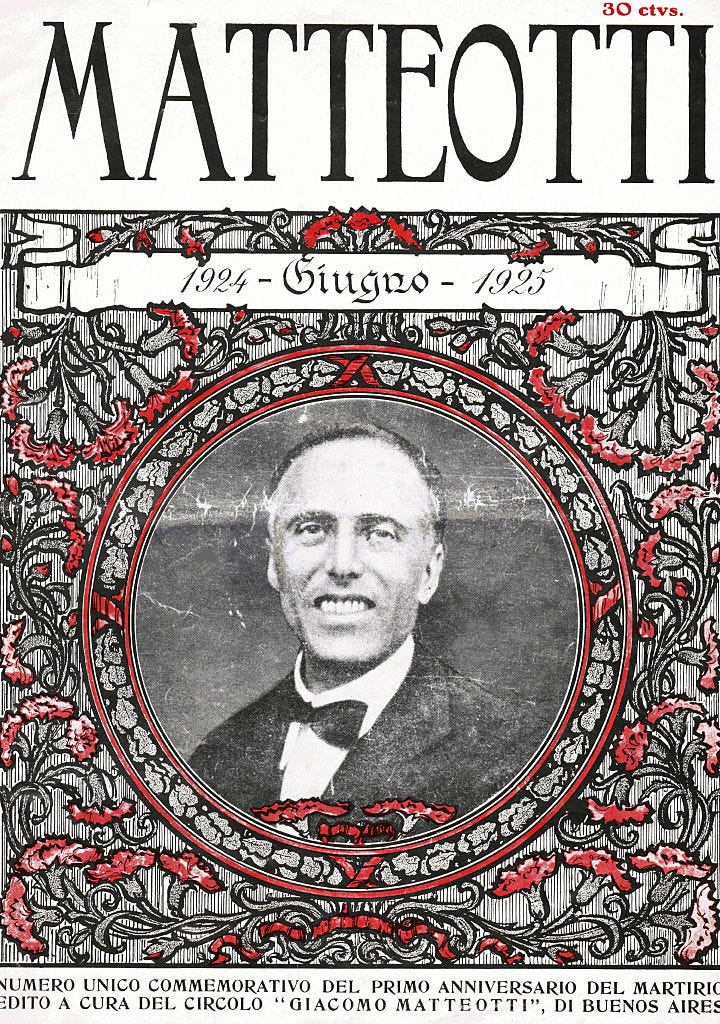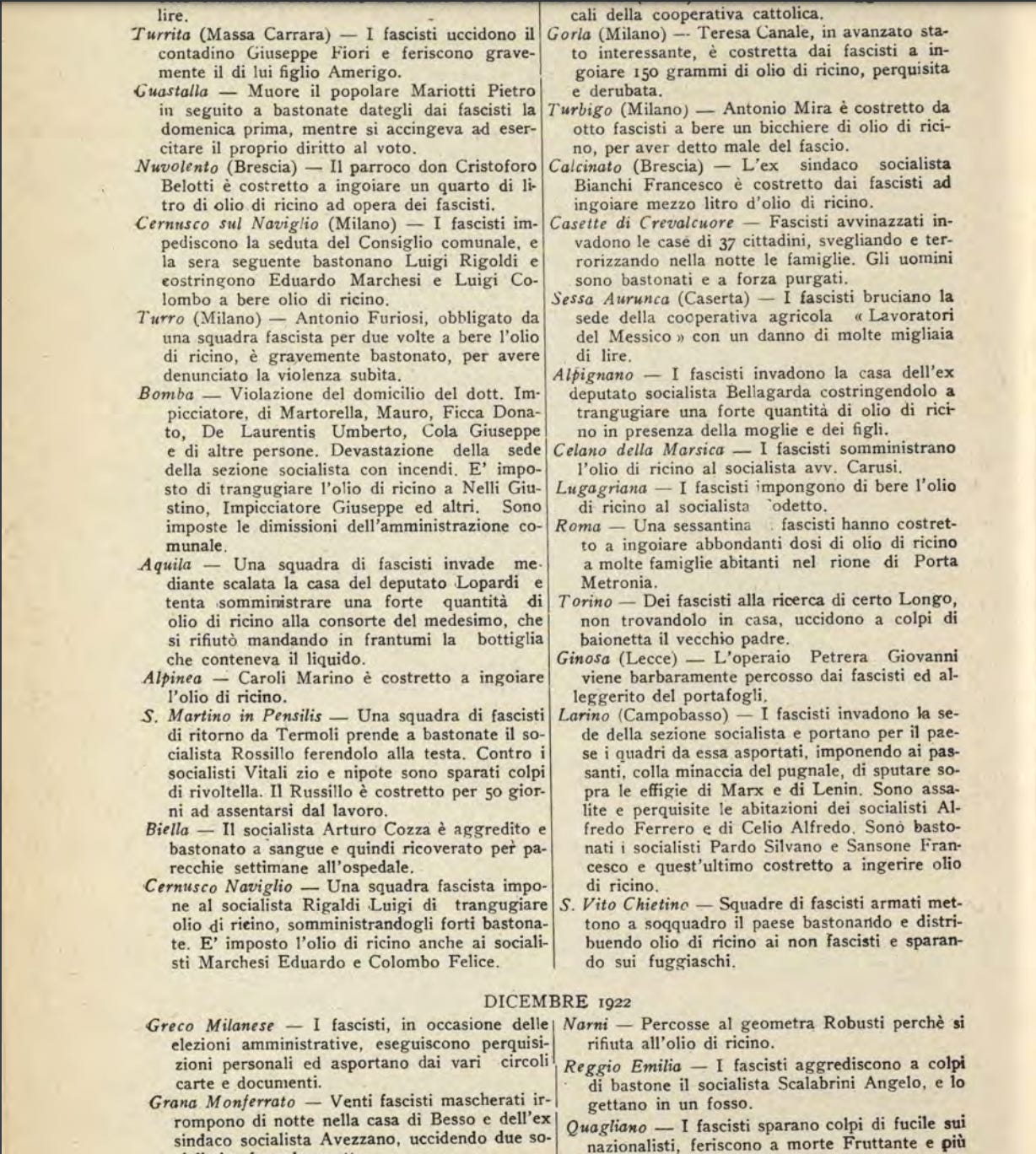Democratic Heroes: Giacomo Matteotti, Killed for Exposing Fascist Corruption
Today we Remember Giacomo Matteotti, Anti-Fascist Politician and Democratic Hero
This essay inaugurates a Lucid series on democratic heroes past and present. It presents portraits of individuals who have stood up to the forces of corruption and violence and told the truth at great personal risk. Some heroes are active today, defending freedoms, and others sit in prison. Still others were silenced permanently.
This was the fate of our first hero, Giacomo Matteotti, who takes us back to the early days of Fascism, when Benito Mussolini was Prime Minister of a coalition government (1922-1924) and trying to expand his powers at the expense of Italian democracy. When I was in graduate school, I learned that Matteotti, leader of the Italian Socialists and a member of Parliament, was murdered by agents of Mussolini's personal secret police because he was a leftist leader speaking out about Fascist violence and electoral fraud.
As it turns out, this was not the full story. Thanks to the pioneering research of Italian historian Mauro Canali, we now know that Matteotti was killed because he had gathered evidence of a massive scandal. The American oil company Sinclair (already tainted by the American Teapot Dome Scandal) was paying bribes to Fascist officials in return for a monopoly on mineral oils, gas, and hydrocarbons found on Italian territory. The anti-Fascist Matteotti was thus also a pioneering anti-corruption crusader who had information that an autocrat wanted to keep secret.

Matteotti is our first democratic hero because he denounced a leader's use of the authoritarian playbook--violence, corruption, lying, election fraud. His murder also changed history. It sparked an investigation that ultimately led Il Duce to declare dictatorship so he could make his legal problems vanish.
Fascism took off as a decentralized militia movement financed by industrial and agrarian bosses to repress strikes, farm and factory occupations, and other post-World War One leftist labor actions. Between 1919 and 1922, the Fascists beat up and killed thousands of leftists, liberals, progressive priests, and anyone who disagreed with them. They took over town councils and city governments, trashed and torched trade union offices, stalked politicians and their families, and raped men and women.
Although King Victor Emmanuel III, as Commander of the Italian armed forces, could have disarmed the 30,000-strong blackshirts at any time, when Mussolini announced a "March on Rome" in October 1922 to extend Fascist control to the Capital, the timid monarch appointed Mussolini as prime minister.
Matteott had personally experienced Fascism's violence, having been kidnapped and assaulted by Fascists in 1921. That did not stop him from speaking out in Parliament. In May 1922, when Fascist squads occupied the city of Rovigo, Matteotti denounced the "state of terror" there as "armed gangs" took over. When these thugs became the ruling party of Italy, Matteotti continued to sound the alarm, working nights and weekends to document the ongoing violence.
The result was his 1923 book. A Year of Fascist Domination. Listing hundreds of aggressions by blackshirt militias, it provided a snapshot of how violence was transforming daily life under Fascist rule.

Each terse annotation is a story of tragedy: In December 1922, in the northern city of Varese, Fascist militiamen beat up people returning from a funeral. In May 1923, in Musocco, near Milano, a Fascist squad invaded a socialist club and beat up two workers. And in September 1923, in Florence, Fascists assaulted two people at the Apollo theater who refused to sing a Fascist song.
During the run-up to the 1924 election, the Fascists passed an electoral reform (the Acerbo Law) that would hand any party receiving over 25% of the vote two-thirds of seats. This measure, plus voter intimidation and fraud, gave the Fascist Party 64.9% of the vote. Matteotti protested in Parliament that the election results should be annulled, bringing shouted death threats from Fascist deputies around him.
Two months later, Matteotti disappeared. Witnesses saw men attack him on Rome’s busy Lungotevere and drag him into their car. His body, bearing stab wounds and other injuries, was found only three months later. His murder plunged Il Duce into a crisis that threatened to end his career. The opposition press accused him of complicity in the crime and Mussolini’s conservative allies pressed him to step down.
When strongmen feel they are in danger, they become more, not less, aggressive. To avoid losing power and going to prison, on January 3, 1925, Il Duce announced the first Fascist dictatorship. This excerpt from his speech to Parliament, which alludes to the Matteotti crime, chills me every time I read it: "I, and I alone, assume political, moral, and historical responsibility for all that has happened…If Fascism has been a criminal association, I am the head of that criminal association…."
Mussolini would stay in power for the next twenty years. Even after his death his involvement in Matteotti's murder was covered up until Canali found evidence that Mussolini himself ordered the hit to keep his oil deal secret.
Matteotti was not only uncommonly courageous, producing powerful critiques of Fascist abuses of power that would cost him his life. He was a visionary. He knew that those who told him he was being too alarmist and intransigent —those who assured him that Mussolini would "settle down" and become a more conventional politician— underestimated the danger. Matteotti looked into the void and continued his work, undeterred. For this reason, we honor and remember him as an anti-Fascist defender of democracy.
Note: An English translation of Mauro Canali's book Il delitto Matteotti will be published by Palgrave Macmillan in 2024, with a preface by me. I mention Matteotti in context of a century of anti-corruption crusaders in Strongmen: From Mussolini to the Present. To know more about Matteotti: Matteotti House and Museum




This is the first time I have heard the story of Giacomo Matteoti. Let us honor him today and remember what he and others like him have taught us. Be courageous. Be upright. Reject cynicism and never apologize for caring about the community over profits.
Excellent article. No truer words have been said than "When strongmen feel they are in danger, they become more, not less, aggressive."
The same holds true for nation states. When national leaders fear they are in jeopardy of losing power, they go on the offensive, perhaps leading to war. The aggressiveness has been used countless times in anticipation of rallying a non-committal or disinterested population behind a common cause. Fear and insecurity, real or imagined, is a great way to keep the rabble in line.